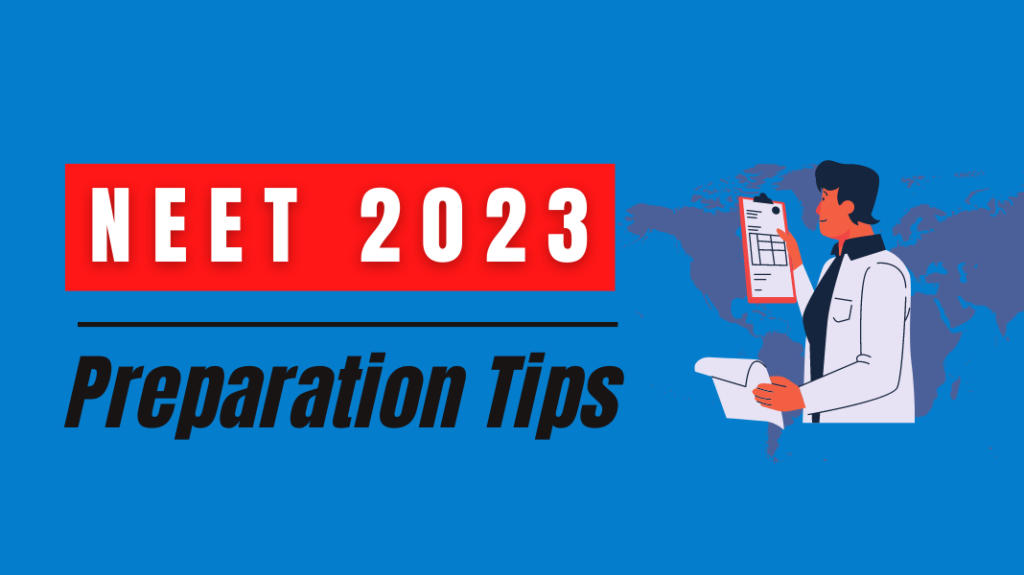
- Educational Qualifications
- Age Criteria
- Subjects
- Syllabus and Exam Pattern
- Important Topics
- NEET Preparation Tips
- Choosing Study Material
- Important books for NEET 2023 – Biology
- Important books for NEET 2023 – Physical chemistry
- Important books for NEET 2023 – Organic chemistry
- Important books for NEET 2023 – Inorganic chemistry
- Important books for NEET 2023 – Physics
- Effective Study Routine
- Common Mistakes
- Conclusion
- FAQ
Educational Qualifications
Candidates must have passed 10+2 or equivalent with Physics, Chemistry, Biology/Biotechnology, and English as core subjects from a recognized board.
Age Criteria
Candidates above the age of 17 years can apply. There is no upper age limit for candidates willing to appear for the UG NEET exams.
Subjects
Exam is mainly based on Chemistry, Physics and Biology. There are a total of 180 MCQs with a time duration of 3 hours. For every correct answer, the candidate gets 4 marks and 1 mark is deducted for every wrong answer.
Syllabus and Exam Pattern
There are a total of 180 MCQs with a time duration of 3 hours. For every correct answer, the candidate gets 4 marks and 1 mark is deducted for every wrong answer.
NEET (UG) is a Pen & Paper-based Test, to be answered on the specially designed machine gradable OMR sheet using Ball Point Pen provided at the Centre.
NMC (National Medical Commission) has notified the syllabus of NEET (UG). The Question Paper will be based on the given syllabus (Appendix-IV) which is available on the NMC website (https://www.nmc.org.in/neet/neet-ug).
Important Topics
-
- Physics – Mechanics, Optics, Thermodynamics, Nuclear Physics
-
- Chemistry – Mole Concept, Periodic Table, General Organic Chemistry, Coordination Chemistry, Chemical Bonding.
-
- Biology – Genetics, Cell Biology, Morphology, Ecology & Environment, Reproduction, Basics of Biotechnology, Physiology of Animals & Plants.
NEET Preparation Tips
-
- Be Familiar With The Syllabus
-
- Choose High-Quality Study Material
-
- Create a Realistic Study Timetable
-
- Prepare Notes While Learning
-
- Revise Regularly
-
- Practice Mock Tests
Choosing Study Material
Important books for NEET 2023 – Biology
-
- NCERT (Textbook) Biology – Class 11 & 12
-
- Trueman’s Biology – Vol 1 and Vol 2
-
- SC Verma Biology books
-
- Biology by GRB Bathla’s Publications
-
- Biology Books by Pradeep’s Publications
-
- Dinesh Objective Biology
Important books for NEET 2023 – Physical chemistry
-
- NCERT (Textbook) Chemistry – Class 11 & 12
-
- Truemans’s Biology for class 11th and 12th
-
- Physical Chemistry by O.P. Tandon
-
- Physical Chemistry by P. Bahadur
Important books for NEET 2023 – Organic chemistry
-
- NCERT (Textbook) Chemistry – Class 11 & 12
-
- Organic Chemistry by Morrison and Boyd
-
- Organic Chemistry Objective by Arihant
-
- Organic Chemistry by O.P. Tandon
Important books for NEET 2023 – Inorganic chemistry
-
- Inorganic Chemistry by O.P. Tandon
-
- Concise Inorganic Chemistry
Important books for NEET 2023 – Physics
-
- NCERT (Textbook) Physics – Class 11 & 12
-
- Concepts of Physics by H. C. Verma
-
- D. C. Pandey Objective Physics
-
- Problems in General Physics by I. E. Irodov
-
- Fundamentals of Physics by Halliday, Resnick, and Walker (For optics, waves, and electromagnetism)
-
- Objective Physics by Pramod Agarwal (For practising problems in mechanics and rotational dynamics)
Effective Study Routine
Being honest and realistic, no one can tell you how to make effective routine for yourself, only you can see what works best for you. Make your routine and see if works or not, if its not working change it.
Common Mistakes
-
- Ignoring NCERT: Students should make sure that they are through with the NCERT books.
-
- Not following the core syllabus: Students should make sure that they are through with the NCERT books.
-
- Avoiding subjects: Students should make sure that they are giving equal time to each subjects.
-
- Not being regular to studies: Students should make sure that they are studying regularly and making no excuses to their study time table.
-
- Avoiding tests: Students should make sure that they are giving regular tests and are not ignoring tests.
Conclusion
FAQ
1. Is NCERT Enough For NEET?
NEET covers the NCERT syllabus. While a major section of the question paper is based on NCERT from classes 11 and 12, a considerable portion is also asked beyond the NCERT sources.
2. Is NEET Exam Tough?
NEET is a difficult. But with proper hard work and dedication, one can crack the NEET exam.
3. Do 12th Marks Matter In NEET?
Class 12th marks are not so important to get admission to the MBBS course. But, it is necessary that the candidate must have scored the minimum required percentage in PCB in 12th to appear for the NEET examination i.e. Gen – 50%, OBC/SC/ST – 40%, PWD – 45%.
Also see:
Tags: How to prepare for neet, neet preparation tips, neet 2023, neet syllabys, neet tips, neet 2024, neet study material, best books for neet preparation, How to prepare for neet, neet preparation tips, neet 2023, neet syllabys, neet tips, neet 2024, neet study material, best books for neet preparation, How to prepare for neet, neet preparation tips, neet 2023, neet syllabys, neet tips, neet 2024, neet study material, best books for neet preparation, How to prepare for neet, neet preparation tips, neet 2023, neet syllabys, neet tips, neet 2024, neet study material, best books for neet preparation
